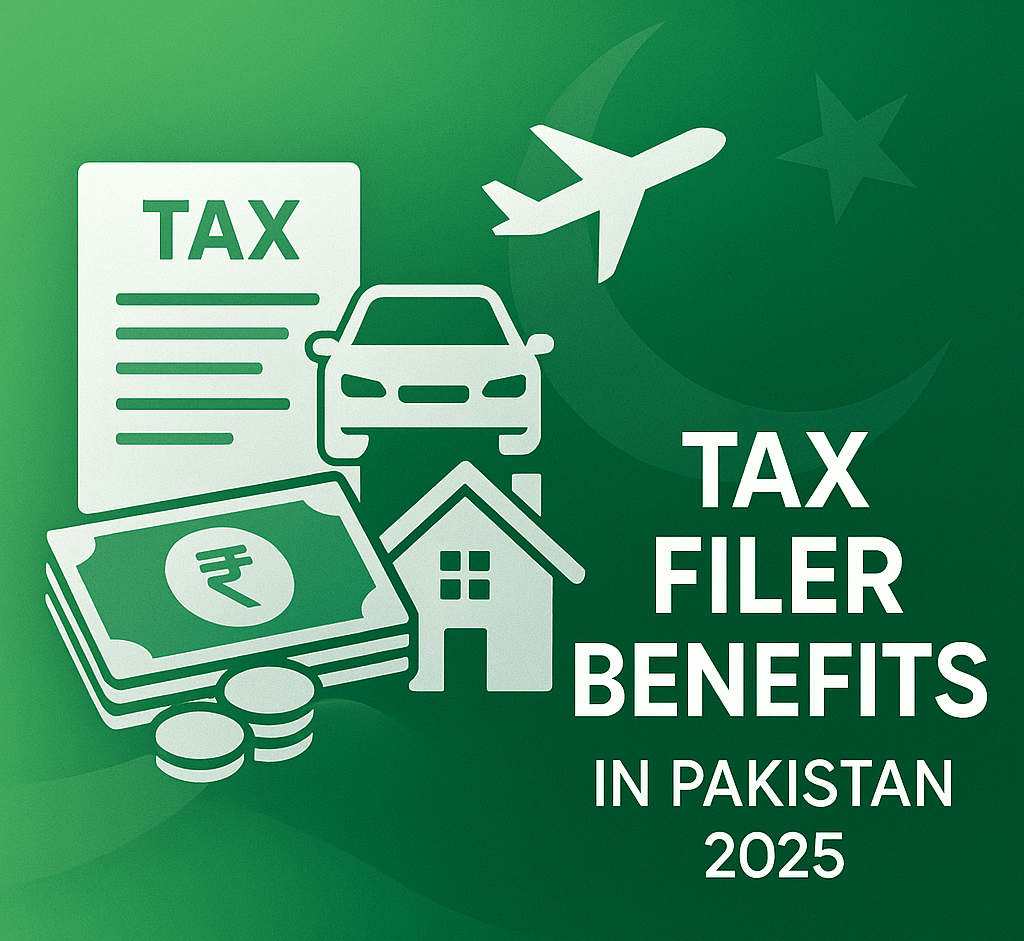Filing taxes in Pakistan isn’t just a legal obligation—it’s a smart financial move that brings plenty of benefits for both individuals and businesses. Whether you’re a salaried employee, a business owner, or even an overseas Pakistani, being a registered tax filer can save you money, simplify transactions, and open new opportunities. On the other hand, staying a non-filer comes with penalties, higher costs, and even restrictions.
In this blog, we’ll break down what it means to be a tax filer, the advantages you can enjoy, the responsibilities you must meet, and the risks of ignoring the system.

What Is a Tax Filer?
A tax filer is someone who submits their annual income tax return to the Federal Board of Revenue (FBR) and follows tax laws. These individuals and businesses are listed in the Active Taxpayers List (ATL)—an official government record that provides financial privileges and reduces costs in many day-to-day transactions.
On the flip side, a non-filer is someone who doesn’t submit tax returns or avoids paying taxes, which leads to heavier tax rates and limited financial freedom.
Key Benefits of Being a Tax Filer
1. Reduced Tax Rates and Withholding TaxPerhaps the biggest perk is paying lower withholding tax. Filers enjoy reduced rates on banking transactions, property deals, vehicle registration, and more. For example:
- Services Income Tax: A filer may pay 10%, while a non-filer pays 20%.
- Vehicles: For a 1500cc car, a filer pays about PKR 8,000 annually, compared to PKR 19,000 for a non-filer.
- Property Transactions: Filers pay only 2% tax when buying/selling property, whereas non-filers are charged 5%.
- Prize Bonds: Filers are taxed at 15% on winnings, while non-filers pay double.
👉 Budget 2025–26 Update: Salaried individuals are set to benefit from revised tax slabs. Income up to PKR 600,000 annually will now be tax-free. For income between PKR 600,000 and 1,200,000, the rate has dropped from 5% to just 1%. This means thousands of rupees in monthly savings for many Pakistanis.
2. Tax Rebates, Credits, and RefundsFilers can legally reduce their taxable income through:
- Medical and education expenses
- Charitable donations
- Refund claims on excess withholding tax (like deductions on mobile/internet bills).
Exporters and registered businesses can also claim sales tax refunds when input tax exceeds output tax, especially on zero-rated goods.
3. Enhanced Financial CredibilityBeing a filer boosts your reputation. It shows transparency, which banks, investors, and institutions value. Filers are more likely to:
- Get loans and credit cards easily
- Access lower interest rates
- Invest in securities and mutual funds
- Qualify for government contracts and tenders
4. Simplified Legal and Financial TransactionsFiling taxes creates a solid financial history that simplifies tasks like vehicle or property registration. It also lowers the risk of FBR audits. And even if an audit happens, filers usually get faster clearance and legal protection.
The government is also working on a simplified tax return form—requiring just seven pieces of information for salaried individuals and small businesses—removing the need for expensive consultants.
5. Special Benefits for Overseas PakistanisOverseas Pakistanis holding a NICOP are now included in the ATL. They receive the same benefits as resident filers, including:
- Lower taxes on vehicle registration and transfers
- Reduced withholding tax on property deals, banking transactions, and prize bonds
- Easier stock market investments
6. Contribution to National DevelopmentPaying taxes is more than just personal gain—it’s a civic duty. Tax revenue funds roads, schools, hospitals, and infrastructure, helping Pakistan grow stronger and more prosperous.
7. Professional Tax Services for BusinessesBusinesses can also take advantage of services like NTN registration, SECP company registration, sales tax compliance, call center registration, PEC registration, and accounts preparation. Platforms such as The Smart Filer provide quick (24–48 hours), accurate, and secure tax services, making compliance hassle-free.
Responsibilities of a Tax Filer
Becoming a filer comes with certain obligations:
- Timely Filing: Every individual and business with taxable income must file their returns under Section 114 of the Income Tax Ordinance 2001.
- Accurate Reporting: Taxpayers must honestly declare their annual income, expenses, and wealth details.
Risks of Staying a Non-Filer
Non-filers face serious disadvantages, including:
- Heavy Penalties: Audits, fines, and even bank account or property seizures.
- Higher Tax Rates: Up to 200% more on vehicle tokens, property transactions, and financial services.
- Transaction Restrictions: Difficulty opening bank accounts, investing in shares, or buying property and vehicles.
- Future Restrictions: Proposals have included blocking mobile SIM cards, higher taxes on purchases, or even travel restrictions.
The Filing System: Challenges and Solutions
While the benefits are clear, many people still find the FBR’s filing system complicated. That’s why tax experts and services like The Smart Filer or Sidekick exist—to make filing easier, accurate, and stress-free.
By simplifying processes and offering guidance, these services help people avoid penalties while ensuring they enjoy every benefit of being a filer.
Final Thoughts
Becoming a tax filer in Pakistan isn’t just about following the law—it’s about making a smarter financial decision for your future. From lower taxes and refunds to financial credibility and investment opportunities, the benefits far outweigh the effort.
Whether you’re living in Pakistan or abroad, filing your taxes is a step toward personal financial growth and contributing to the nation’s development.